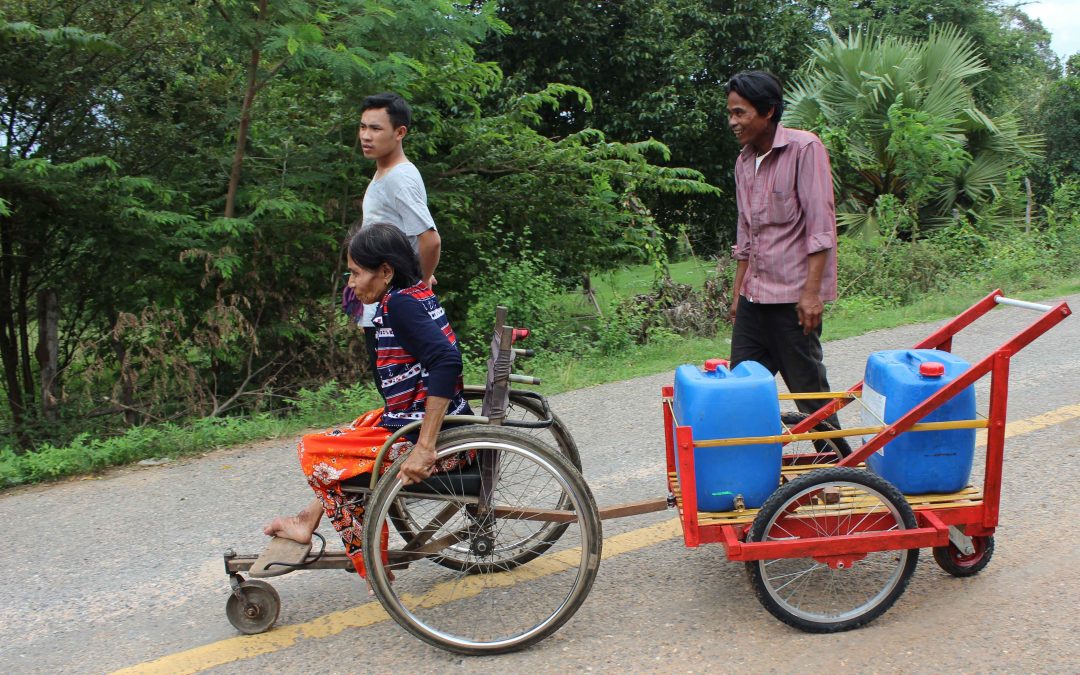The future of mobility technology is exciting, and will lead to higher quality, more affordable, easy to use and universally accessible products and services. It is critical that this emerging field keeps up with or leads broader global trends in mobility, such as the evolution of electric vehicles.
EWB Australia is committed to supporting people with disability access independent mobility and livelihoods – particularly in rural areas, with projects in development right now that are already improving the lives of people living in rural Cambodians. In rural Cambodia there is a lack of mobility technologies for people with disability to use when transporting goods such as water, fertilizer or produce. This results in individuals either using poorly designed manual carts (which require high levels of strength) or using diesel/petrol powered mechanical ox tractors (if they can afford the >$1000 USD purchase). These mechanical ox tractors are vastly over-designed when used for basic transport. They are designed to provide high-levels of torque and traction for specific uses, such as ploughing a field.
Providing people with disability with better manual (no motor) mobility technologies could potentially satisfy their transport requirements in the short-term while reducing the likelihood of additional petrol-powered mechanical ox tractors being implemented into unsuitable applications (such as transport).
People with disability in rural Cambodia are likely to be disproportionately negatively impacted by climate change due to their low-levels of disposable income and high reliance on subsistence agriculture. While exact economic data is not available, it is estimated that people with disability in Cambodia sit within the lower quintile (bottom 20%) of disposable income ($52 per month, KH Gov Census). This means small increases in the cost of essential resources (such as water delivered to their property by truck) will have a large impact on their disposable income. Similarly, a lack of income diversification, due to a lack of education, opportunity and cultural stigma, has potential to negatively impact people with disability as climate change impacts temperature, water availability and appropriateness of traditional crops (such as rice).
EWB Australia is currently working with Light for the World Cambodia on a number of projects to provide mobility options for people with disability in rural Cambodia. These projects include:
- Power Assist Module (PAM) – an adaptable electric power assist module that can be attached to a range of locally available carts and trailers. It can also be used to provide a power assist to wheelchairs.
- Wheelchair Accessible Moto (WAM) – a universally designed moto that allows wheelchair users to access independent mobility without leaving their wheelchairs. The Wheelchair accessible moto can also carry additional passengers and other payloads. The current version is petrol powered but with the introduction of electric vehicles in Cambodia EWB is looking at developing an electric vehicle version along with the required enabling support ecosystem for charging.
- Wheelchair Watercart – a low-cost manual (no power) cart designed to provide additional capacity for wheelchair users to transport goods around the home/farm. For example, transporting water from a nearby well to their home, approximately 500m away. This cart costs less than $30 and improves the independence of the wheelchair user by enabling larger amounts of goods to be transported in one trip, instead of multiple, time-consuming trips.
Most mobility and transport products in Cambodia are typically petrol or diesel powered. To ensure its projects keep up with current global trends EWB is looking to understand the requirements of a road map to ensure renewable energy powered electric vehicles and mobility products can support users in rural Cambodia.
In early 2018 the World Bank published a report highlighting that more than 26% of Cambodian households lived off-grid, however up to 97% had access to one source of electricity. For many of the households EWB engages with, this takes the form of a battery that is charged at a centralised recharge business.
This poses an interesting challenge when looking at electric mobility products – how do people recharge their products without having to travel significant distances on a daily basis. Within this challenge is an interesting opportunity – could electric mobility products that reduce transport costs and increase agricultural livelihoods be an enabling factor for rural families and in particular people with disabilities access renewable energy.
This is a question we intend to explore.
This project receives support from the Australian Government through the Australian NGO Cooperation Program and through the generous support of individual donors.


